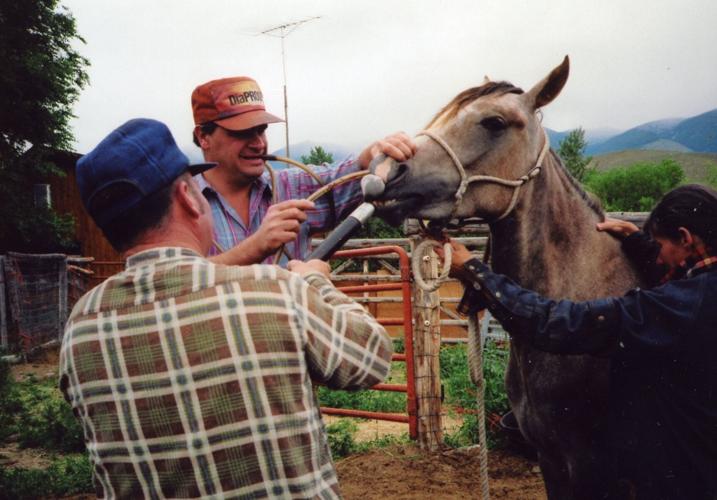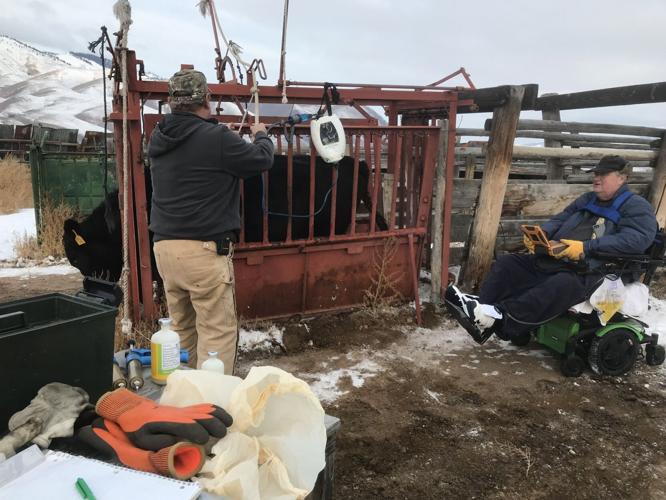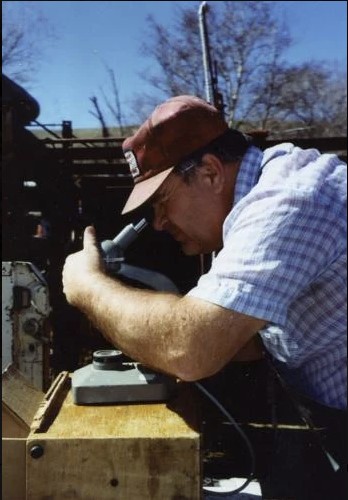Dr. Robert Cope, DVM 1975
Tribute to a great man: Veterinarian Dr. Robert Cope's death felt across Lemhi County
On Dec. 28, 2022, Idaho lost a good friend. He lost his battle with cancer, but kept doing
what he loved—assisting ranchers—until the very end.
Known simply as “Cope” to friends and clients, Dr. Robert Cope was the main cattle
veterinarian in Lemhi County, Idaho, for 44 years. He also spent 20 years in public
service to his community during that time and to agriculture in Idaho and the West. He
was inducted into the Eastern Idaho Agricultural Hall of Fame on March 18, 2022.
Dr. Cope was born Jan. 12, 1951, in Topeka, Kansas, and grew up on a farm. He planned to
become a Navy officer and was a National Merit finalist and Presidential Scholar in 1969.
Becoming a veterinarian in a small rural community was not on his list!
He was appointed to the U.S. Naval Academy, but because of a badly injured knee
(playing basketball his senior year of high school) was unable to physically qualify for the
Navy. So he went to Kansas State University and received a Bachelor of Science degree
in 1973 and Doctor of Veterinary Medicine in 1975.
His knee was considered too bad to stand on a ship, but he spent the next 45 years
wrestling 1,500-pound animals. He worked briefly for a veterinarian in Bowman, North
Dakota, until he saw an ad in the American Veterinary Association Journal for a practice
in Idaho that was for sale.

Dr. Robert Cope tubes a young horse with mineral oil to relieve an impaction. Dr. Cope was the main cattle veterinarian in Lemhi County, Idaho, for more than four decades before his death on Dec. 28, 2022. (All photos on this page courtesy of Heather Smith Thomas)
He drove to Salmon, Idaho, in October 1977. He later told friends: “The opening line of
John Denver’s ‘Rocky Mountain High’ says it all: ‘He was born in the summer of his 27th
year, coming home to a place he’d never been before.’ That’s what happened to me! And
Lou Gehrig was wrong. He said he was the luckiest man on the face of the earth, but I
was that luckiest man. I wandered in here and found my true home. I was able to spend
44 years doing what I loved, with the people I loved, and where I loved doing it. I’ve lived
a life that other men could only dream of!”
He purchased the Blue Cross Veterinary Clinic in November 1977 and started making
ranch calls all over the county. Merry Logan worked at the clinic for a short time in those
early years.
“Working with Cope, I soon learned that he was one of the smartest and kindest people
I’d ever met in my life,” Logan said. “Then in later years I’ve been grateful to him for the
work he did with federal lands issues.”
Logan continued: “He was a county commissioner for many years, and worked on federal
lands committees. When wolves became a problem in 1994 (one of them killed a calf
here, a few days after being released, and wolf advocates claimed the calf was born
dead), he immediately became involved scientifically, and proved the ranchers were
right.”

Dr. Robert Cope, right, reads an ultrasound while someone else operates the ultrasound probe on a cow.
He also helped and supported young people in the community. He didn’t have kids of his
own but he loved kids.
“He was always looking for an opportunity to teach them,” Logan said. “If one of their 4-H
animals got sick or had a problem at the fair, he always helped, and could explain things
so well.”
Chris French grew up on his parents’ ranch near Salmon and remembers Cope coming
multiple times to take care of cattle problems.
“He supported the youth in this county, purchasing 4-H projects at the fat stock sale at the
fair each year,” French said. “My parents were very strict about the money from our 4-H
calves. It went into a college fund. Cope was investing in the next generation; when we
got ready to go to college, most of it was paid for with money we’d saved over the years.”
He bought numerous animals each year; there were many ranch families he helped.
“Cope told me a long time ago why he didn’t have any kids. He chose not to, when he
was in vet school,” French said. “He knew he could either dedicate his life to a family or
to a career helping agricultural families. His rancher clients became his family. … He told
me that because of choices he made—not spending money on himself—he could hold
down the costs of his services. He didn’t have a family to raise or spend time with and
was able to charge reasonable prices.”
He wanted his clients to be able to make a living and be able to pay for his services.
“Now that Cope is gone, and even during this past year when he was unable to come to
the ranch to pull a calf or treat a large animal, whenever we had to call another vet, the
cost was dramatically higher,” French said.
Phil Moulton, a rancher on Wimpy Creek, said Dr. Cope has always been selfless and
accommodating.
“He reminds me of the James Herriot stories. He’d do anything to help you, even if in the
middle of the night and nasty weather, and his fees have always been reasonable,”
Moulton said. “Last year he told me the ranchers of the Lemhi Valley have been his
family. He said his father passed away when he wasn’t very old; he didn’t have much
family. He loved and appreciated the ranchers, and we loved and appreciated him.”
Michael Thomas, who grew up on his parents’ ranch on Withington Creek has a few
cattle as well as a custom fencing business, but for many years he and his wife had a
large ranching operation with several leased places.
“Cope helped us many times, but he was also a friend,” Thomas said. “Unlike some of the
younger vets today, I think Cope cared even more about the people than the animals—
and he did care about the animals. The thing that separated him from other vets today is
that he’d come out at 30 below zero to do a C-section in the middle of the night.”
Thomas said Dr. Cope would do whatever he could to bring down the cost for his customers.
“He drove an old two-wheel drive Ford pickup for years, and everything he did was to
save his clients money. He made a lot of personal sacrifices to help his clients,” Thomas
said. “He once said that if his clients couldn’t succeed and be sustainable, he wouldn’t
have a practice, so he kept his prices low. And he never refused to come out on a ranch
call. The only time he ever had to tell us he couldn’t come was when he was in
Washington, D.C. (probably working on some political effort to help rural western
agriculture) and it was physically impossible. But he’d still give advice over the phone and
never charged anyone for advice.”

A younger Dr. Robert Cope looks at bull sperm under a microscope.
Dr. Cope had a lot of practical knowledge because he had so much experience with all kinds
of animals and could probably remember everything he learned in vet school and
afterward, including things he read about or heard of. He was never afraid to suggest
something to try. With him gone, it’s like the library burned down; he had such a wealth of
knowledge and advice he shared with clients.
Dr. Cope had many friends since he was very involved in local, regional, state and federal
government. Steve Lish, administrator at the Discovery Care Center (an assisted living
facility in Salmon), served with Cope on the City Council.
“He was not only a great friend, but also a mentor. He had a brilliant mind, and a great
memory,” Lish said. “Whether he was working as a vet, or the city council, county
commissioner, or the many state and federal appointments, he was brilliant.”
He served the rural West in many ways most of us were unaware of; he never drew
attention to himself or took credit for his achievements. He accomplished a great deal in
these positions because he was a tremendous strategist.
“It didn’t matter whether he was playing a board game with friends, or working with
people who had opposing philosophies about wolves—trying to find common ground
between them,” Lish said. “Not everybody can find that common ground, but he was often
able to do that because he was such a great strategist.
“He served us well, being able to get folks to agree upon some very controversial issues;
he put forth ideas that were adopted and beneficial to Lemhi County as well as on the
state and federal level. Those of us who were close to him were very proud of those
accomplishments.”
Beyond being a good person to work with, Cope was also a great friend.
“We spent time together enjoying music trivia, sports and games,” Lish said. “He ran the
local Fantasy Football League for almost 20 years. All our fees went into a pot for charity.
We had to pick a charity when we entered, and whoever won (first, second and third
place), the money went to those charities. At one time we had given about $13,000 to
various charities.
“Cope had a clever sense of humor, and this was also where his crafty strategy came into
play. If he even got a hint that you were playing a joke on him, by the time you got it
figured out, the joke would be on you!”
He was a very independent and unique character and never worried about what people
thought of him. When he walked to the courthouse for meetings he was always in bib
overalls and barefoot, and sometimes no shirt, walking with his dog.
“After his passing I thought about many of the times he tried to help us,” Thomas said.
“He was a lot smarter than most of us but never talked down to us, and he respected us.
He was an influential person in my world, as a kid growing up; he was a professional I
looked up to, because of his knowledge, intelligence, work ethic, and the fact he always
had time for everyone. He made a long-lasting impression on me. I looked up to him as a
role model.”
Thomas continued: “He even helped us long distance, when Carolyn and I were ranching
in Mackay, having a wreck with scours and major problems. We called him numerous
times, and he sent vet supplies on the Salmon River Stage that we picked up in Mackay.
He helped us a lot, with many phone calls, and we relied on him. He even came to our
place in Mackay one time when we were in a pinch and couldn’t get a vet. He treated a
bony lump jaw cow for us with intravenous sodium iodide, in an old broke-down facility. He did a lot of work in dilapidated facilities!”
Dr. Cope will be remembered as someone with a lot of gumption.
“This is one of the things I admired about him—how tough he was, and how determined.
Nothing phased him,” Thomas said. “We’ve had him help us do a C-section or deliver a
breech calf in the middle of the night when all we had was a flashlight and no shelter. All
he’d have on was a rubber overall; he’d strip down even in the coldest weather to work
on a cow.”
No matter how hard the work, Cope always kept a positive attitude.
“One thing I always enjoyed about Cope was that no matter how long the day or the job
or how hot or cold the weather, he always had a sense of humor,” Thomas said. “He
loved to tell jokes, and had great stories; working cattle with him was always fun.”
Dr. Cope was a walking encyclopedia of information about all sorts of things.
“For 35 years he hosted the local New Year’s Eve radio program, playing old favorites
and interspersing music with trivia until midnight,” Thomas said. “He knew so much about
each artist and all their songs. Cope had an incredible collection of music and information
in his head about every artist. That made it fun to listen to.”
The past two years, however, Rockwell Smith hosted that program because Cope was in
failing health. The recent one, just three days after Cope’s passing, Rockwell dedicated
the program to Cope, interspersing tidbits of information about his life, throughout the
program.
Even with failing health in recent years (heart problems, pacemaker, ruptured appendix
and peritonitis, prostate cancer) Cope continued to help his clients, putting in long days
pregnancy-checking and all the other jobs they needed him to do. His cancer got
suddenly worse, however, and went into his spine. By January 2022 he had to reluctantly
say no to many friends who needed him, except for advice he could give over the phone,
or at their ranch from his wheelchair as they did the physical part, or working on a small
animal (even young calves) in his home, at a table.
Even after he began to use a wheelchair, Cope continued going to ranches (with help
from people to drive his van and do the physical part of the work) to preg-check cows and
Bangs vaccinate heifers, all through 2022, until a few days before he died. He’d promised
his clients that he would do everything he could for them, for as long as he could, and he
kept that promise.
Chris French visited him a lot at his home.
“At one point he broke into tears and told me he’d known the day was coming that he
wouldn’t be able to continue his work, but didn’t know it would be this way—so crippled,”
French said. “He regretted the fact that people were having to do a lot of things for him,
but I told him he’d served so many people for all those years; these were just small things
we could do for him. Several people had gotten together and built a ramp at his back
door for his wheelchair.”
All those months when he couldn’t get in and out of bed or wheelchair by himself—with
no movement or feeling in his legs—his wife Terrie (with help from her sister and friends)
was his caregiver. He chose to stay home and run the course of those final months
without cancer treatments, and just keep doing what few things he could do. He realized
that any treatment would only be a temporary measure and not a cure, as well as
uncomfortable and costly. So, no hospitals, no treatment.
The incredible thing was how much he was able to continue helping ranchers even after
he needed to use a wheelchair.
“Bart Stephanishen made that possible, taking Cope to ranches in his wheelchair accessible van,” Lish said. “Cope was pretty emotional about his disability, frustrated
about the things he could no longer do, but that side of him was something we never saw
until he became ill. He said the worst thing was that he was unable to be out there
working, where he belonged. It was wonderful that Bart made it possible for him to
continue some aspects of his work.”
Dr. Cope didn’t want a funeral or memorial service. He told Jenelle Thomas that he attended
his dad’s funeral when he was 15, and never went to another, and didn’t want one. But
there will be a wake for him at a later date, for friends to get together and celebrate his
life and share memories and stories about Cope. He would want everyone to have fun
and have a good time.